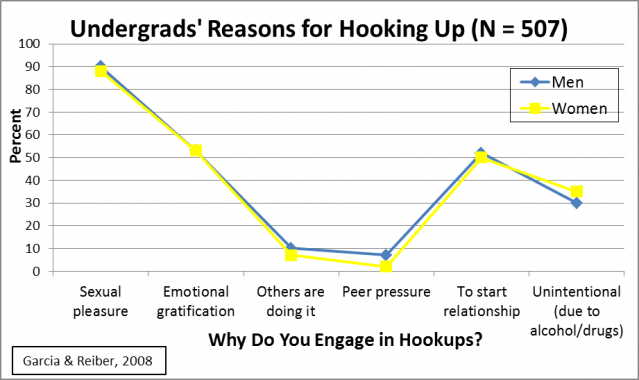Sex
Why Men and Women Hook Up Today
Studies seeking differences in male and female motivations uncover a surprise.
Posted June 4, 2014

Vidux/Shutterstock
There is a widespread belief that men want to have sex for fun, whereas women want to have sex for love. The logical extension is that women don’t really want casual sex, and if they do engage in it, they’re probably doing it in hopes it will be more than just casual sex.
How much truth is in these assumptions among young adults today?
In a 2014 study published in Sociological Perspectives, sociologist Heidi Lyons at Oakland University and her colleagues interviewed a random sample of 700 young adults in an Ohio county, ages 18 to 22; 62 percent were not in college [3]. Among the 36 percent of participants who had had casual sex during the previous two years (defined as sex with people “you were not really dating or going out with”), the top two reasons, among both genders, were related to sexual pleasure and satisfaction: “Because I was horny” and “I thought it would be fun.” Men were slightly more likely than women to cite the "fun" response, but these were the only two reasons above the mid-point of the scale for both sexes.
Furthermore, both sexes were equally driven by drinking/drugs or feeling "too young to be tied down." And believe it or not, both sexes were equally—although fairly weakly—driven by desire for a relationship or love. A non-trivial minority of students did say they wanted to become the boyfriend or girlfriend of the person after they hooked up, but these percentages were fairly similar for women (34 percent) and men (28 percent). The only major gender difference in motives had to do with peer influences: Guys were much more driven by “friends were doing it” than were women; for women, this reason was almost entirely insignificant.

These findings resonate with other recent research on college students. In a 2008 study of 500 undergraduates from upstate New York, virtually identical numbers of women and men selected various reasons for hooking up, with sexual pleasure chosen by 90 percent of participants [2]. Interestingly, about 50 percent of both men and women said they hooked up for reasons of emotional gratification or to start a relationship, with unintentional reasons due to drugs or alcohol coming in as close third (~33%).

Similarly, in one of my own studies, published this year in the Archives of Sexual Behavior, male and female college students did not differ in how much they were driven by well-being-enhancing, “autonomous” motives (fun, exploration, gaining experience) as opposed to wellbeing-detracting, “nonautonomous” motives (peer pressure, intoxication, relationship hopes, coping with negative emotions, material reward) in their casual sex experiences over the course of the academic year [5]. For both sexes, the "good" motives far outweighed the "bad."

Finally, this is consistent with other studies of casual sex motivation among women only. For example, across 146 unique hookup events reported by a sample of 118 women before and after their first semester in college, the most common reason for their hookups was—by far—sexual desire, chosen for 80 percent of all hookups [1]. The other most frequently endorsed motives (out of a list of 19) were: spontaneous urge (58 percent), partner’s attractiveness (56 percent), intoxication (51 percent), partner’s willingness (33 percent), and to feel attractive/desirable (29 percent).
Is there any research finding significant gender differences?
The only study I am aware of that did find large gender differences in casual sex motivation is a 1999 study in which almost twice as many undergraduate men as women reported being motivated to hook up by "sexual desire" (47 percent vs. 29 percent) and four times as many women as men cited "increasing chances for long-term commitment" (44 percent vs. 9 percent) [4]. But either things have changed since, or the methodology of that study was somehow misleading, because virtually all research conducted since suggests otherwise.
In summary, it appears that contemporary young women and men are quite similar in their stated reasons for hooking up—and most of those reasons revolve around fun and enjoyment. Intoxication and hopes for greater emotional or romantic attachment are also fairly prevalent—but, again, equally so in both sexes.
Of course, one could argue that this is just what people are telling themselves (and researchers) and that, deep down inside, greater gender differences exist, but that's a whole other discussion.
Have a casual sex story to share with the world? That's what The Casual Sex Project is for.
Follow me on Twitter @DrZhana for daily updates on the latest in sex research, check out my website or my Facebook page for more information about me, or sign up for my monthly newsletter to stay up to date with all my sex research-related activities.
References
[1] Fielder, R. L., & Carey, M. P. (2010b). Prevalence and characteristics of sexual hookups among first-semester female college students. Journal of Sex and Marital Therapy, 36, 346–359. doi:10.1080/0092623X.2010.488118.
[2] Garcia, J. R., & Reiber, C. (2008). Hook-up behavior: A biopsychosocial perspective. Journal of Social, Evolutionary, and Cultural Psychology, 2, 192–208.
[3] Lyons, H. A., Manning, W. D., Longmore, M. A., & Giordano, P. C. (2014). Young adult casual sexual behavior: Life-course-specific motivations and consequences. Sociological Perspectives, 57, 79-101. doi:10.1177/0731121413517557
[4] Regan, P. C., & Dreyer, C. S. (1999). Lust? Love? Status? Young adults’motives for engaging in casual sex. Journal of Psychology and Human Sexuality, 11, 1–24. doi:10.1300/J056v11n01_01
[5] Vrangalova, Z. (2014). Does casual sex harm college students’ wellbeing? A longitudinal investigation of the role of motivation. Archives of Sexual Behavior. doi:10.1007/s10508-013-0255-1




